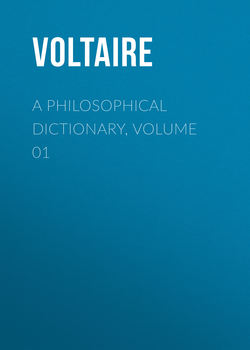Читать книгу A Philosophical Dictionary, Volume 01 - Voltaire, Вольтер - Страница 5
ABLE – ABILITY
ОглавлениеABLE. – An adjective term, which, like almost all others, has different acceptations as it is differently employed.
In general it signifies more than capable, more than well-informed, whether applied to an artist, a general, a man of learning, or a judge. A man may have read all that has been written on war, and may have seen it, without being able to conduct a war. He may be capable of commanding, but to acquire the name of an able general he must command more than once with success. A judge may know all the laws, without being able to apply them. A learned man may not be able either to write or to teach. An able man, then, is he who makes a great use of what he knows. A capable man can do a thing; an able one does it. This word cannot be applied to efforts of pure genius. We do not say an able poet, an able orator; or, if we sometimes say so of an orator, it is when he has ably, dexterously treated a thorny subject.
Bossuet, for example, having, in his funeral oration over the great Condé, to treat of his civil wars, says that there is a penitence as glorious as innocence itself. He manages this point ably. Of the rest he speaks with grandeur.
We say, an able historian, meaning one who has drawn his materials from good sources, compared different relations, and judged soundly of them; one, in short, who has taken great pains. If he has, moreover, the gift of narrating with suitable eloquence, he is more than able, he is a great historian, like Titus, Livius, de Thou, etc.
The word able is applicable to those arts which exercise at once the mind and the hand, as painting and sculpture. We say of a painter of sculptor, he is an able artist, because these arts require a long novitiate; whereas a man becomes a poet nearly all at once, like Virgil or Ovid, or may even be an orator with very little study, as several preachers have been.
Why do we, nevertheless, say, an able preacher? It is because more attention is then paid to art than to eloquence, which is no great eulogium. We do not say of the sublime Bossuet, he was an able maker of funeral orations. A mere player of an instrument is able; a composer must be more than able; he must have genius. The workman executes cleverly what the man of taste has designed ably.
An able man in public affairs is well-informed, prudent and active; if he wants either of these qualifications he is not able.
The term, an able courtier, implies blame rather than praise, since it too often means an able flatterer. It may also be used to designate simply a clever man, who is neither very good nor very wicked. The fox who, when questioned by the lion respecting the odor of his palace, replied that he had taken cold, was an able courtier; the fox who, to revenge himself on the wolf, recommended to the old lion the skin of a wolf newly flayed, to keep his majesty warm, was something more than able.
We shall not here discuss those points of our subject which belong more particularly to morality, as the danger of wishing to be too able, the risks which an able woman runs when she wishes to govern the affairs of her household without advice, etc. We are afraid of swelling this dictionary with useless declamations. They who preside over this great and important work must treat at length those articles relating to the arts and sciences which interest the public, while those to whom they intrust little articles of literature must have the merit of being brief.
ABILITY. – This word is to capacity what able is to capable—ability in a science, in an art, in conduct.
We express an acquired quality by saying, he has ability; in action, by saying, he conducts that affair with ability.
ABLY has the same acceptations; he works, he plays, he teaches ably. He has ably surmounted that difficulty.
